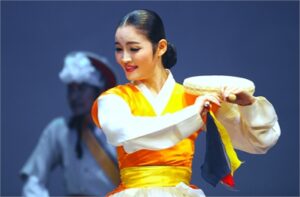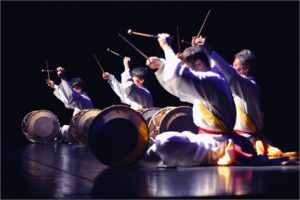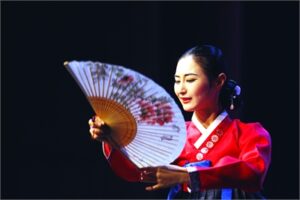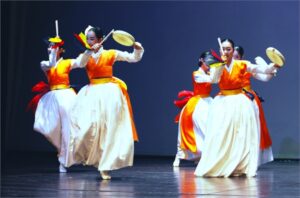Eleventh Korea-Arab Friendship Caravan

Photo by Saad Abdullah Al-Ajmi
The Eleventh Korea-Arab Friendship Caravan was launched in the King Fahad Cultural Centre, Riyadh, Saudi Arabia, on 14 October 2018. The festival was funded by the Ministry of Foreign Affairs of the Republic of Korea and the Korea Foundation. This year’s cultural events of the Caravan took place in three Arab countries: Saudi Arabia, Riyadh (King Fahad Cultural Centre, October 14), UAE, Abu Dhabi (Abu Dhabi National Theater, October 17), and Kuwait (Abdul Hussain Abdul Redha Theater, October 20).
The purpose of the 11th festival was to reinforce the relationships between people and to increase a mutual understanding and benevolence between the people of Korea and the Arab region. To reach these goals, the cultural delegation, consisting of the National Gugak Center (Traditional Korean dance team) and Expression Crew, along with more than twenty celebrated Korean artists arrived in Saudi Arabia. The festival activities were accompanied by the performances of such famed plays as Gugak classical music, Expression Crew with “Marionette” dances (B-boy team), and the concerts of Samdo Seoljanggu, Yeonheungmu, and Salpuri traditional folk dances.

Photo by Saad Abdullah Al-Ajmi
Gugak, Korean classical music, is passed on from each generation, and celebrates and displays the history and culture of the Republic of Korea. The National Gugak Center was founded in 1951, to preserve and share the art of traditional Korean performances and the unique art displays passed down from thousands of years ago. In addition to playing the unique royal court music and its original dances, the Center also promotes modern music and its development. Jindo National Gugak Center, opened in 2004, and has become one of the most treasured branches throughout the Republic of Korea. This Center is admired around the world for the Jindo Arirang folk song, Ganggangsullae (circle dance for ladies), and Jindo Buk (drum) dance.
The job of the Expression Crew (B-boy team) was to act out the “Marionette” dances which display a modern part of Korean culture. It offered the Arab world a chance to see different characteristics of Korea and its culture. Marionette is a hip-hop performance which was inspired by a European marionette puppetry show of wooden puppets and creative dance composition. The production presents an attractive stage of several scenes composed of emotional and expressive music with grand dance pas. This show always brings with it the mixed feelings of sorrow, pleasure, and anger and is a favorite of all audiences.

Photo by Saad Abdullah Al-Ajmi
The Festival also included the performances of Samdo Seoljanggu; the Ensemble of four percussions. The four Janggu is an hourglass-shaped drum, playing percussion-style music, along with a composition of slow and fast rhythms performing harmony and uniqueness in one shape; Yeonheungmu.The traditional dance, Yeonheungmu, consists of improvisation; a chance to tell a story about women enjoying a sunny spring day.
Salpuri, the traditional folk dance, was created in the beginning of the 20th century in Jeolla Province and is meant to be performed on the stage, which shows the abstract expressionism of Korean culture. The dance begins with slow and elegiac rhythms, gradually rising to a suppressing wave of white cloth, symbolizing one’s soul towards the sky, creating the stunning shapes and forms to accentuate the gorgeousness of the dance. The Pangut, the traditional folk performance, is a treasured part of Korean festivals and occasions. The aim of the harmony of beautiful music and dance is to wish peace and good harvest to the villages and their inhabitants. These performances and cultural examples of the Korea-Arab Friendship Caravan are designed to show the deep respect and admiration of a new generation towards the culture and heritage of their centenarian roots.
The Korea-Arab Society (KAS) is a non-profit organization founded and sponsored by the Korean and Arab governments to develop and increase the cooperation between the Republic of Korea and the Middle Eastern Region. Much of the credit for the success of this project must be given to the new South Korean Ambassador to Saudi Arabia, JO Byung Wook, who has boasted of his goal of a new age of economic cooperation between the two countries. He often stated that “The two countries are now embarking on a journey of even closer friendship and cooperation for the next half-century and beyond.” The Korea-Arab Friendship Caravan; the central project of KAS, was first organized in 2008, by the Seoul-based Korea-Arab Society. Its goal was to stand for the valued diplomacy between the Republic of Korea and the Arab region and to display and introduce Korean culture and arts, history, and heritage to the Arab world. Since its launch, this festival has become an essential and popular cultural celebration with an increased audience each year.

Photo by Saad Abdullah Al-Ajmi
The first Caravan traveled in eleven Arab countries: Algeria, Egypt, Kuwait, Libya, Morocco, Oman, Palestine, Qatar, Saudi Arabia, Tunisia, and the UAE. The Caravan displayed many different features of the Korean philosophy; ethos, and viewpoint with the purpose to increase the growth of communal culture. Another goal was to strengthen the possible cooperation in the fields of culture, economics, education and academic representation of the two regions. The Caravan took place in the Arab countries during the months of October-November each year. One highlight was successfully hosting the Korean official delegation and the diplomatic representatives of the Middle Eastern Region.
On final observation, Ambassador Jo Byung-Wook reflected on the event stating that it was “inspired by the old tradition of the caravans that connected the West to the East through the Silk Road. The Korea-Arab Society has been organizing this cultural caravan that tours Middle Eastern countries to promote mutual understanding and communication between Korea and the Arab world.” It was an incredible success.
Alexander Woodman
is a faculty member of College of Science and Humanities at the Prince Mohammad bin Fahd University. His research interest includes global health, international health policy development, transnational and transcultural health politics, and visual culture. He reports from the Gulf.